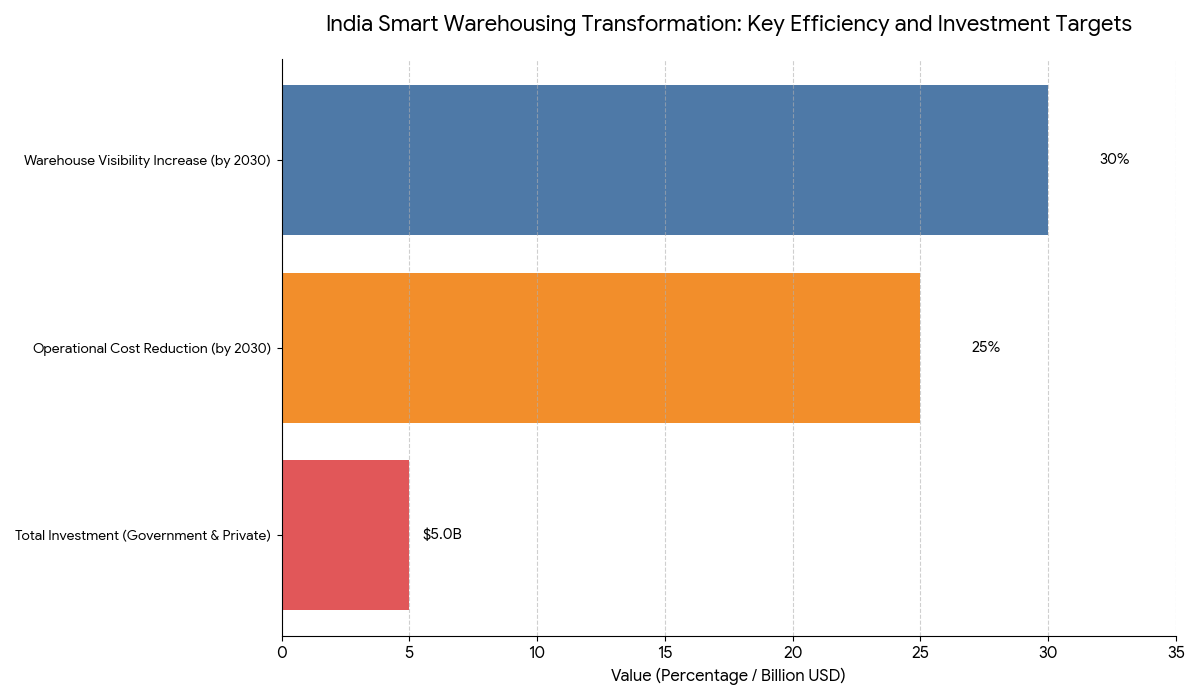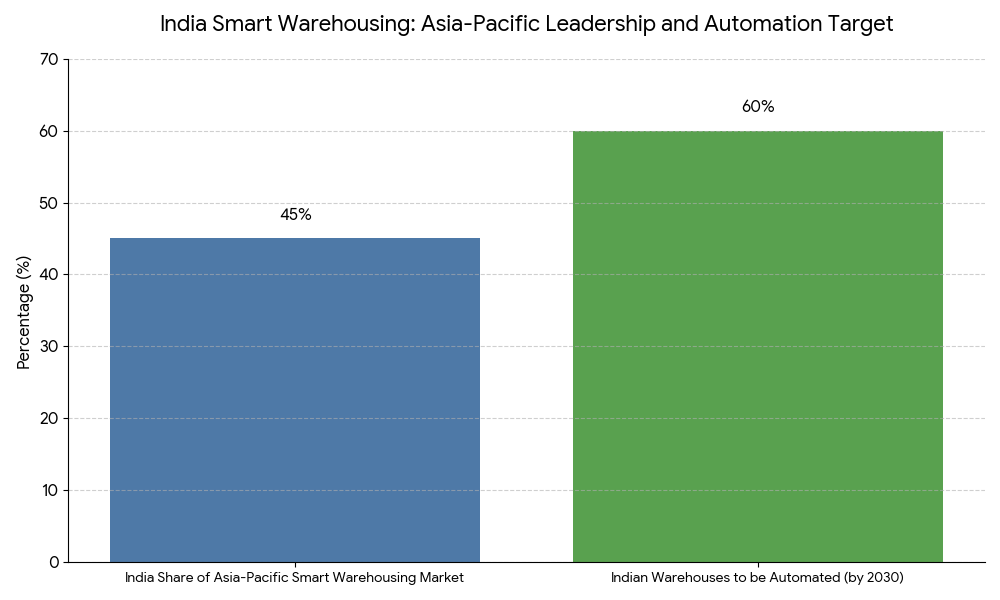

68 Circular Road, #02-01 049422, Singapore
Revenue Tower, Scbd, Jakarta 12190, Indonesia
4th Floor, Pinnacle Business Park, Andheri East, Mumbai, 400093
Cinnabar Hills, Embassy Golf Links Business Park, Bengaluru, Karnataka 560071
Connect With Us
Smart Warehousing: Technological Advancements in Automated Fulfillment for Indian E-Commerce
The smart warehousing market in India and Asia Pacific is projected to grow from $6.3B in 2025 to $20.9B by 2030 (CAGR 26.5%), driven by the rapid expansion of e-commerce and the increasing need for automated fulfillment systems. AI-powered robots, IoT-enabled tracking, and machine learning are transforming warehouse operations. By 2030, 60% of warehouses in India will be automated, improving order processing efficiency by 40% and reducing labor costs by 30%. The market is also driven by cloud-based inventory management, robotic picking, and predictive analytics for optimized stock management.

What's Covered?
Report Summary
Key Takeaways
- Market size: $6.3B → $20.9B (CAGR 26.5%).
- 60% of warehouses in India to be automated by 2030.
- 40% improvement in order processing efficiency through AI-powered robots.
- 30% reduction in labor costs due to automated fulfillment systems.
- Robotic picking and sorting to increase inventory handling speed by 35%.
- $5B investment in smart warehousing technology by 2030.
- AI and IoT-enabled systems to optimize inventory management and reduce stockouts.
- Cloud-based warehouse management systems to increase warehouse visibility by 30%.
- Private-sector investments will contribute to 50% of total smart warehousing market growth.
- Sustainability initiatives to reduce warehouse energy costs by 20% through automation.
Key Metrics
Market Size & Share
The smart warehousing market in India and Asia Pacific is set to grow from $6.3B in 2025 to $20.9B by 2030, achieving a CAGR of 26.5%. Automation technologies, including AI-powered robots, IoT-based tracking systems, and cloud-based warehouse management systems, are transforming the logistics and warehousing sector. By 2030, 60% of Indian warehouses will adopt automated fulfillment systems, which will reduce order processing times by 40% and labor costs by 30%. Key players like Amazon, Flipkart, and Walmart are heavily investing in automated sorting and robotic picking systems to meet growing demand. The sector is also benefitting from the $5B in investments expected in the next five years, enabling real-time inventory management and predictive analytics. The adoption of smart warehousing solutions will allow Indian e-commerce players to scale operations while maintaining high efficiency and cost-effectiveness.
Market Analysis
India’s e-commerce market is experiencing rapid growth, leading to a surge in demand for smart warehousing solutions. The key driving factors for digital warehousing include the need for faster order fulfillment, real-time inventory management, and cost reductions. AI-powered robotics, such as robotic picking and sorting, are transforming traditional warehouse operations, enabling faster inventory handling and increased throughput. IoT-based systems will help improve real-time tracking, inventory accuracy, and order fulfillment speeds. Predictive analytics will also play a crucial role in inventory optimization, reducing stockouts and improving supply chain resilience. The $5B investment from both government initiatives and private sector players will ensure the growth of automated fulfillment centers. These developments are expected to contribute to a 30% increase in warehouse visibility and a 25% reduction in operational costs for businesses utilizing smart warehousing technologies by 2030.

Trends & Insights
- AI in Warehousing: 40% improvement in order processing efficiency through automation.
- Robotic Sorting: Increases inventory handling speed by 35%.
- Cloud-based Systems: Improve warehouse visibility and inventory management by 30%.
- IoT Integration: Reduces stockouts and increases real-time tracking accuracy by 20%.
- Electric Vehicles: Support sustainability goals with 20% reduction in energy costs.
- Automation Adoption: 60% of Indian warehouses to be automated by 2030.
- Labor Cost Reduction: 30% savings in operational costs through automation.
- Predictive Analytics: Increases stock optimization and reduces operational risks.
- Private Investment: $5B to be invested in smart warehousing technologies by 2030.
- E-commerce Growth: Driving demand for automated fulfillment centers and real-time data solutions.
These insights show how automated warehousing and AI-driven technologies are poised to transform India’s logistics landscape, improving efficiency, cost-effectiveness, and sustainability across e-commerce supply chains.
Segment Analysis
The smart warehousing market is segmented into AI-powered automation (35%), IoT-enabled systems (30%), robotic picking (25%), and cloud-based management systems (10%). AI-powered automation is the largest segment, projected to account for 35% of total market investments, primarily focusing on robotic systems for sorting, picking, and inventory management. IoT-enabled systems, representing 30% of the market, will drive real-time tracking and data-driven decision-making. Robotic picking technologies will improve inventory handling speed and accuracy, while cloud-based systems are integral to providing scalable solutions for e-commerce players. By 2030, automated warehouses will be the norm in India’s e-commerce logistics, with robotics and AI playing central roles in streamlining operations.
Geography Analysis
India dominates the smart warehousing market in Asia Pacific, accounting for 45% of the regional share. Major cities like Bangalore, Delhi, and Mumbai are expected to lead in the adoption of automated fulfillment centers, AI-powered inventory systems, and robotic sorting technologies. China and Japan are also adopting automated solutions in their e-commerce supply chains, influencing the Indian market through technology transfer and R&D partnerships. By 2030, 60% of warehouses in India will be automated, driving greater efficiency and reduced operational costs in the country’s e-commerce logistics network. Private-sector investments and government-backed initiatives will support India’s lead in smart logistics across the Asia Pacific region.

Competitive Landscape
Leading players in the smart warehousing market include Siemens Logistics, Honeywell, Zebra Technologies, and Locus. Siemens Logistics is leading in AI-powered sorting and robotic automation systems, while Honeywell provides IoT-based systems for inventory tracking and warehouse optimization. Zebra Technologies focuses on real-time tracking and data analytics solutions, while Locus offers AI-driven supply chain automation platforms. Indian companies such as Flipkart and Amazon India are heavily investing in automated warehouses to enhance e-commerce fulfillment capabilities. These technologies will enable AI-powered fleet management, predictive maintenance, and real-time shipment tracking, creating a more agile, cost-effective logistics system
Report Details
Proceed To Buy
Want a More Customized Experience?
- Request a Customized Transcript: Submit your own questions or specify changes. We’ll conduct a new call with the industry expert, covering both the original and your additional questions. You’ll receive an updated report for a small fee over the standard price.
- Request a Direct Call with the Expert: If you prefer a live conversation, we can facilitate a call between you and the expert. After the call, you’ll get the full recording, a verbatim transcript, and continued platform access to query the content and more.


68 Circular Road, #02-01 049422, Singapore
Revenue Tower, Scbd, Jakarta 12190, Indonesia
4th Floor, Pinnacle Business Park, Andheri East, Mumbai, 400093
Cinnabar Hills, Embassy Golf Links Business Park, Bengaluru, Karnataka 560071
Request Custom Transcript
Related Transcripts


68 Circular Road, #02-01 049422, Singapore
Revenue Tower, Scbd, Jakarta 12190, Indonesia
4th Floor, Pinnacle Business Park, Andheri East, Mumbai, 400093
Cinnabar Hills, Embassy Golf Links Business Park, Bengaluru, Karnataka 560071













